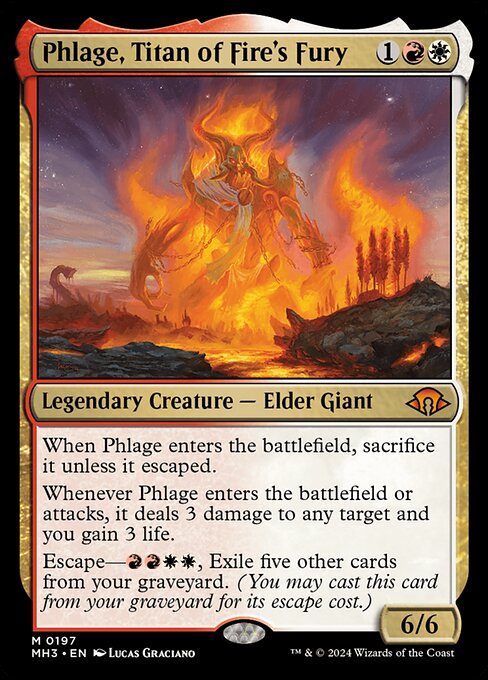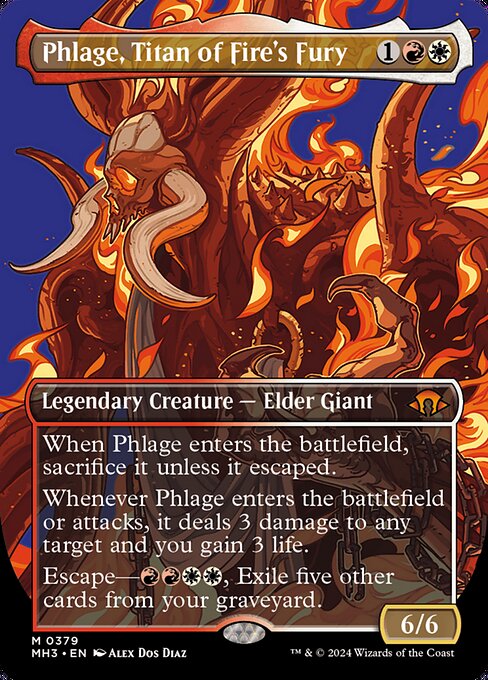Phlage, Titã da Fúria Ígnea
Criatura Lendária — Ancião Gigante
Quando Phlage, Titã da Fúria Ígnea, entrar no campo de batalha, sacrifique-o, a menos que ele tenha escapado.
Toda vez que Phlage entra no campo de batalha ou ataca, ele causa 3 pontos de dano a qualquer alvo e você ganha 3 pontos de vida.
Escapatória — , exile cinco outros cards de seu cemitério.
Toda vez que Phlage entra no campo de batalha ou ataca, ele causa 3 pontos de dano a qualquer alvo e você ganha 3 pontos de vida.
Escapatória — , exile cinco outros cards de seu cemitério.
6/6
standard
future
historic
gladiator
pioneer
explorer
modern
legacy
pauper
vintage
penny
commander
brawl
alchemy
paupercommander
duel
oldschool
premodern
Rulings
Once you begin casting a spell with escape, it immediately moves to the stack. Players can't take any other actions until you're done casting the spell.
To determine the total cost of a spell, start with the mana cost or alternative cost you're paying (such as an escape cost), add any cost increases, then apply any cost reductions. The mana value of the spell remains unchanged, no matter what the total cost to cast it was and no matter whether an alternative cost was paid.
If you cast a spell with its escape permission, you can't choose to apply any other alternative costs or to cast it without paying its mana cost. If it has any additional costs, you must pay those.
Phlage's first ability causes you to sacrifice it if you didn't cast it, or if it was cast using any permission other than an escape ability.
If a card with escape is put into your graveyard during your turn, you'll be able to cast it right away if it's legal to do so, before an opponent can take any actions.
Escape's permission doesn't change when you may cast the spell from your graveyard.
After an escaped spell resolves, it returns to its owner's graveyard if it's not a permanent spell. If it is a permanent spell, it enters the battlefield and will return to its owner's graveyard if it dies later. It can escape again.
If a card has multiple abilities giving you permission to cast it, such as two escape abilities or an escape ability and a flashback ability, you choose which one to apply. The others have no effect.
Phlage's second ability triggers when it enters the battlefield, even if it didn't escape.
To determine the total cost of a spell, start with the mana cost or alternative cost you're paying (such as an escape cost), add any cost increases, then apply any cost reductions. The mana value of the spell remains unchanged, no matter what the total cost to cast it was and no matter whether an alternative cost was paid.
If you cast a spell with its escape permission, you can't choose to apply any other alternative costs or to cast it without paying its mana cost. If it has any additional costs, you must pay those.
Phlage's first ability causes you to sacrifice it if you didn't cast it, or if it was cast using any permission other than an escape ability.
If a card with escape is put into your graveyard during your turn, you'll be able to cast it right away if it's legal to do so, before an opponent can take any actions.
Escape's permission doesn't change when you may cast the spell from your graveyard.
After an escaped spell resolves, it returns to its owner's graveyard if it's not a permanent spell. If it is a permanent spell, it enters the battlefield and will return to its owner's graveyard if it dies later. It can escape again.
If a card has multiple abilities giving you permission to cast it, such as two escape abilities or an escape ability and a flashback ability, you choose which one to apply. The others have no effect.
Phlage's second ability triggers when it enters the battlefield, even if it didn't escape.
Rulings
Once you begin casting a spell with escape, it immediately moves to the stack. Players can't take any other actions until you're done casting the spell.
To determine the total cost of a spell, start with the mana cost or alternative cost you're paying (such as an escape cost), add any cost increases, then apply any cost reductions. The mana value of the spell remains unchanged, no matter what the total cost to cast it was and no matter whether an alternative cost was paid.
If you cast a spell with its escape permission, you can't choose to apply any other alternative costs or to cast it without paying its mana cost. If it has any additional costs, you must pay those.
Phlage's first ability causes you to sacrifice it if you didn't cast it, or if it was cast using any permission other than an escape ability.
If a card with escape is put into your graveyard during your turn, you'll be able to cast it right away if it's legal to do so, before an opponent can take any actions.
Escape's permission doesn't change when you may cast the spell from your graveyard.
After an escaped spell resolves, it returns to its owner's graveyard if it's not a permanent spell. If it is a permanent spell, it enters the battlefield and will return to its owner's graveyard if it dies later. It can escape again.
If a card has multiple abilities giving you permission to cast it, such as two escape abilities or an escape ability and a flashback ability, you choose which one to apply. The others have no effect.
Phlage's second ability triggers when it enters the battlefield, even if it didn't escape.
To determine the total cost of a spell, start with the mana cost or alternative cost you're paying (such as an escape cost), add any cost increases, then apply any cost reductions. The mana value of the spell remains unchanged, no matter what the total cost to cast it was and no matter whether an alternative cost was paid.
If you cast a spell with its escape permission, you can't choose to apply any other alternative costs or to cast it without paying its mana cost. If it has any additional costs, you must pay those.
Phlage's first ability causes you to sacrifice it if you didn't cast it, or if it was cast using any permission other than an escape ability.
If a card with escape is put into your graveyard during your turn, you'll be able to cast it right away if it's legal to do so, before an opponent can take any actions.
Escape's permission doesn't change when you may cast the spell from your graveyard.
After an escaped spell resolves, it returns to its owner's graveyard if it's not a permanent spell. If it is a permanent spell, it enters the battlefield and will return to its owner's graveyard if it dies later. It can escape again.
If a card has multiple abilities giving you permission to cast it, such as two escape abilities or an escape ability and a flashback ability, you choose which one to apply. The others have no effect.
Phlage's second ability triggers when it enters the battlefield, even if it didn't escape.
Your collection? Your decks?
Want to manage your collection and/or create decks?



 0
0
 25.86€
25.86€

